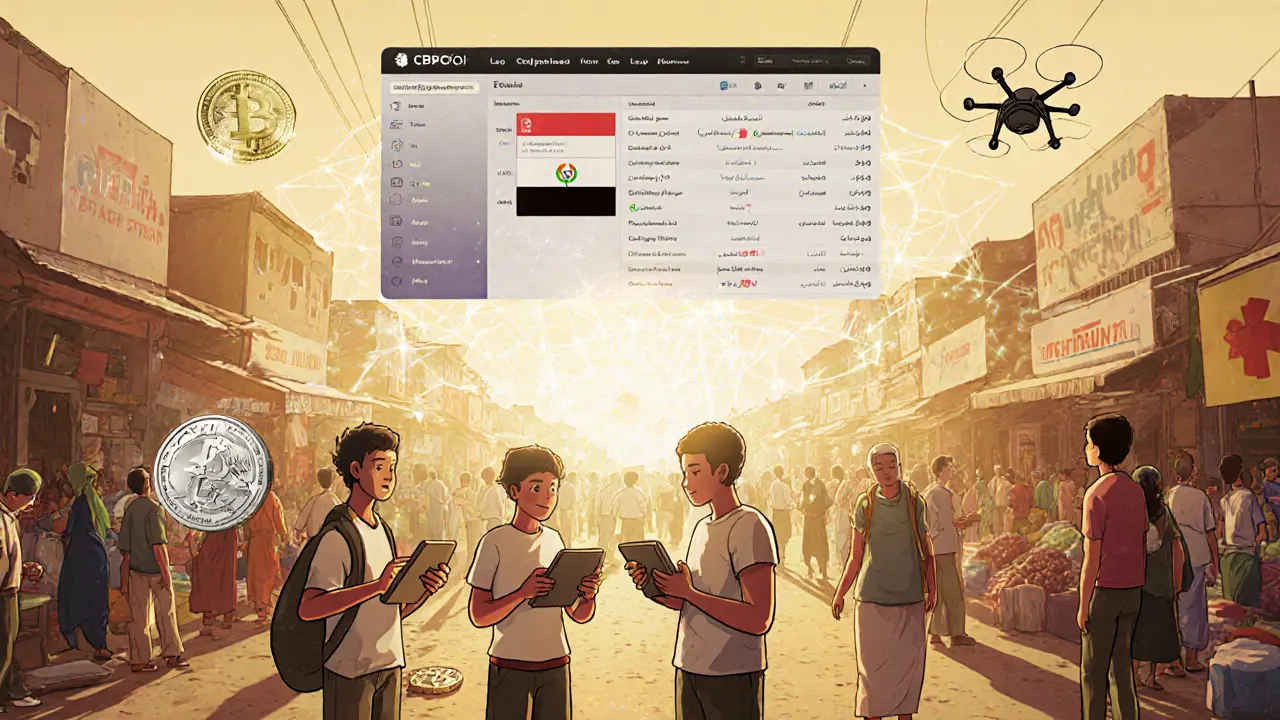Central Bank of Egypt Crypto Ban: What’s Really Happening in 2025
 Aug, 8 2025
Aug, 8 2025
Egypt Crypto Legality Checker
Check Your Crypto Activity
This tool determines whether your crypto-related activity would be legal under Egypt's current regulations based on the Central Bank of Egypt's policies.
Back in 2020, the Central Bank of Egypt (CBE) made it clear: no cryptocurrencies on Egyptian soil. Not trading. Not mining. Not promoting. Not even accepting them as payment. That rule hasn’t changed in 2025. In fact, the CBE has doubled down, issuing fresh warnings every few months about the dangers of crypto investments. But here’s the twist - while buying Bitcoin or selling Ethereum is illegal, using blockchain to track cargo at Egyptian ports? That’s not just allowed - it’s already happening.
Why Egypt Banned Crypto - And Why It Still Matters
Egypt’s ban isn’t just about fear of volatility. It’s rooted in Law No. 194/2020, which gives the CBE total control over the country’s financial system. Under this law, any form of cryptocurrency issuance, exchange, or promotion without CBE approval is a criminal offense. That includes peer-to-peer platforms, decentralized exchanges, and even crypto ATMs. The goal? Protect the Egyptian pound, prevent money laundering, and stop citizens from losing savings to unregulated digital assets. But there’s another layer. In 2018, Egypt’s highest Islamic authority, Al-Azhar, issued a fatwa declaring cryptocurrencies haram - religiously forbidden. That’s rare. Most countries rely on financial regulation alone. Egypt combined law with faith. The result? A cultural barrier as strong as the legal one. For millions of Egyptians, crypto isn’t just risky - it’s wrong.How the Ban Works in Practice
You won’t find any licensed crypto exchanges in Cairo. Banks won’t process crypto deposits. Payment apps like Fawry or Vodafone Cash won’t let you buy Bitcoin. Even international platforms like Binance or Coinbase block Egyptian IP addresses. If you try to transfer funds to a crypto exchange, your bank will flag it - and may freeze your account. The CBE doesn’t need to shut down every wallet. It controls the pipes. If your bank account can’t connect to a crypto platform, you can’t move money in or out. That’s the real power of the ban - it doesn’t try to track every transaction. It cuts off access at the source.But People Are Still Using Crypto - How?
Despite the ban, crypto activity hasn’t disappeared. It’s gone underground. Peer-to-peer trading through Telegram groups, WhatsApp networks, and local meetups is common. Some Egyptians buy Bitcoin from foreign friends or use cash-based P2P platforms like Paxful. Others use VPNs to access international exchanges, then withdraw to foreign bank accounts - often in Dubai or Turkey. The U.S. State Department’s 2025 Investment Climate Report admits enforcement is “unclear.” There are no public records of arrests, fines, or prosecutions. No one’s been jailed for buying Dogecoin. That doesn’t mean the law isn’t real - it means the CBE is focused on prevention, not punishment. Their strategy: scare people away with warnings, not jail cells.
Blockchain? That’s a Different Story
Here’s where Egypt’s approach gets smart. While crypto is banned, blockchain technology is being actively adopted. The Egyptian Customs Authority uses blockchain to track imported goods through its Advanced Cargo Information (ACI) system. That system cuts fraud, reduces delays, and increases tax collection - all without touching cryptocurrency. Other government agencies are testing blockchain for land registration, medical records, and supply chain tracking. The Ministry of Finance is exploring blockchain-based digital receipts to reduce tax evasion. These aren’t speculative projects. They’re practical, government-run tools designed to fix real problems. This split isn’t hypocrisy. It’s strategy. Egypt doesn’t hate technology. It hates uncontrolled money. Blockchain can be monitored. Crypto can’t. That’s the line they drew.What About Central Bank Digital Currency (CBDC)?
The CBE has been quietly testing a digital version of the Egyptian pound - a Central Bank Digital Currency (CBDC). Unlike Bitcoin, this wouldn’t be decentralized. It would be issued, controlled, and tracked by the central bank. Think of it as an upgraded e-wallet - but backed by the state. A CBDC could help millions of unbanked Egyptians access digital payments without needing a traditional bank account. It could reduce cash handling costs and improve monetary policy control. Most importantly - it gives the CBE total oversight. No anonymity. No volatility. No risk to the pound. Talks are ongoing. Pilot programs are likely in the works. But don’t expect a launch before 2027. The CBE is moving slowly, carefully. They’ve learned from other countries that rushed CBDCs and faced public backlash.
What Happens If You Get Caught?
Technically, violating Law No. 194/2020 can lead to fines, asset seizure, or even imprisonment. But in practice? No one’s been charged. Why? Because enforcement is messy. How do you prove someone traded Bitcoin if they used cash or a foreign exchange? How do you track a Telegram group with 500 members across three cities? The CBE’s real weapon isn’t the police - it’s banks. If you send $5,000 to a crypto exchange and your bank notices, they’ll freeze your account and report you. That’s the threat. Not jail. Not fines. Losing access to your money. Most Egyptians who trade crypto do so cautiously - small amounts, cash-based, no paper trail. They know the risk. They just need the option.How Egypt Compares to the Region
Egypt isn’t alone. Saudi Arabia and the UAE have strict rules, but allow regulated crypto exchanges. Nigeria banned banks from crypto transactions but lets individuals trade freely. Turkey lets crypto trade but taxes it heavily. Egypt is unique. It’s the only country in the region that combines a legal ban with a religious fatwa and a selective embrace of blockchain. That’s not an accident. It’s a deliberate model: control money, but not innovation.What’s Next for Egypt and Crypto?
Don’t expect the ban to lift anytime soon. The CBE has too much at stake - monetary control, financial stability, and public trust in the pound. But the door isn’t completely shut. If a CBDC proves successful, it could become the only legal digital currency in Egypt. And if blockchain continues to deliver real results in customs, logistics, and identity systems, the government may start seeing digital assets as tools - not threats. For now, the message is clear: don’t touch crypto. But feel free to use the tech behind it. That’s Egypt’s answer to the digital age - strict on money, curious about machines.Is it illegal to own Bitcoin in Egypt?
Owning Bitcoin or any cryptocurrency isn’t explicitly illegal under Egyptian law - but using banks, exchanges, or payment systems to buy, sell, or trade it is. The ban targets financial institutions and commercial activity, not private possession. However, if you try to convert crypto to Egyptian pounds through a bank, your account will be frozen and reported. So while you might hold crypto privately, you can’t legally use it.
Can I use crypto to send money to family in Egypt?
Sending crypto to someone in Egypt is technically possible, but risky. The recipient can’t cash it out through Egyptian banks or licensed services. They’d need to find a peer-to-peer buyer - often through Telegram or WhatsApp - and get paid in cash. That’s slow, unsafe, and not protected by law. Most Egyptians avoid this route. Official remittance channels like Western Union or MoneyGram are still the only legal and reliable way.
Are crypto mining operations allowed in Egypt?
No. Mining cryptocurrency is prohibited under Law No. 194/2020. The CBE considers mining a form of unregulated financial activity. Even if you’re using your own electricity and hardware, setting up a mining rig in Egypt is a legal risk. Authorities don’t actively raid homes, but if your power usage spikes and you’re linked to crypto mining, your utility provider may report you - and the CBE could investigate.
Why does Egypt allow blockchain but not crypto?
Because blockchain is a tool, and crypto is money. Blockchain can be controlled, audited, and locked to government systems - like tracking cargo at customs. Crypto is anonymous, decentralized, and outside state control. Egypt wants efficiency without losing power over its currency. That’s why they use blockchain for logistics and identity - but block crypto from the banking system.
Is there a chance Egypt will legalize crypto in the future?
Unlikely in the near term. The CBE’s priority is protecting the Egyptian pound and controlling the financial system. Legalizing crypto would mean giving up that control. Instead, Egypt is betting on its own digital currency - a Central Bank Digital Currency (CBDC). If that succeeds, there will be no need for Bitcoin or Ethereum. The government will offer digital money - and keep all the power.
Can foreign crypto companies operate in Egypt?
No. Any foreign company offering crypto trading, wallet services, or exchange platforms to Egyptian residents is violating Law No. 194/2020. The CBE blocks access to these sites and pressures international payment processors to cut off services. Companies like Binance and Kraken don’t have licenses in Egypt - and can’t get them. The only way to legally operate is to avoid serving Egyptian customers entirely.
Does the CBE monitor crypto transactions on the blockchain?
The CBE doesn’t have the technical ability to track individual blockchain transactions in real time. Instead, they monitor bank accounts and payment gateways. If someone tries to send Egyptian pounds to a crypto exchange, the bank flags it. If a business accepts crypto as payment, the CBE investigates the transaction chain. They focus on the financial system’s edges - not the blockchain itself.
Are there any legal crypto-related businesses in Egypt?
Not in the crypto space. But there are legal blockchain startups - especially in logistics, customs, and identity verification. Companies working on blockchain-based land registries, digital IDs, or supply chain tracking are allowed and even encouraged. These firms don’t touch cryptocurrency. They use distributed ledger technology to improve efficiency - exactly what the government wants.
Angel RYAN
November 27, 2025 AT 10:35Most countries panic and ban everything. Egypt picked the middle path and stuck with it.
stephen bullard
November 28, 2025 AT 01:02I wish more governments saw the difference between control and censorship. Egypt’s not stopping innovation. It’s just making sure the state still holds the reins.
SHASHI SHEKHAR
November 28, 2025 AT 02:30Also, the fatwa part? Genius. Religion + law = unbreakable social contract. No one’s gonna risk hell for a few Dogecoins. And honestly? People are still trading anyway - through WhatsApp, cash, Telegram. The system’s not perfect, but it’s working. The CBE doesn’t need to arrest anyone. Just freeze accounts and watch the fear do the work. 👏
CBDC next? 100%. Egypt’s building the future, one controlled digital rupee at a time. And honestly? I’m jealous.
Vaibhav Jaiswal
November 28, 2025 AT 07:20But here’s the twist: they didn’t ban the future. They just said ‘you can’t use it as money, but you can use the tech behind it.’ That’s not a contradiction - that’s wisdom.
Imagine if the U.S. did that. Imagine if we allowed blockchain for voting, supply chains, land titles - but kept Bitcoin locked away from banks. We’d be ahead of the curve. Instead, we’re stuck in ‘is it a security or a currency?’ hell.
Egypt’s not behind. They’re ahead - and they’re not even trying to be cool about it.
Abby cant tell ya
November 30, 2025 AT 05:05Savan Prajapati
December 1, 2025 AT 23:07